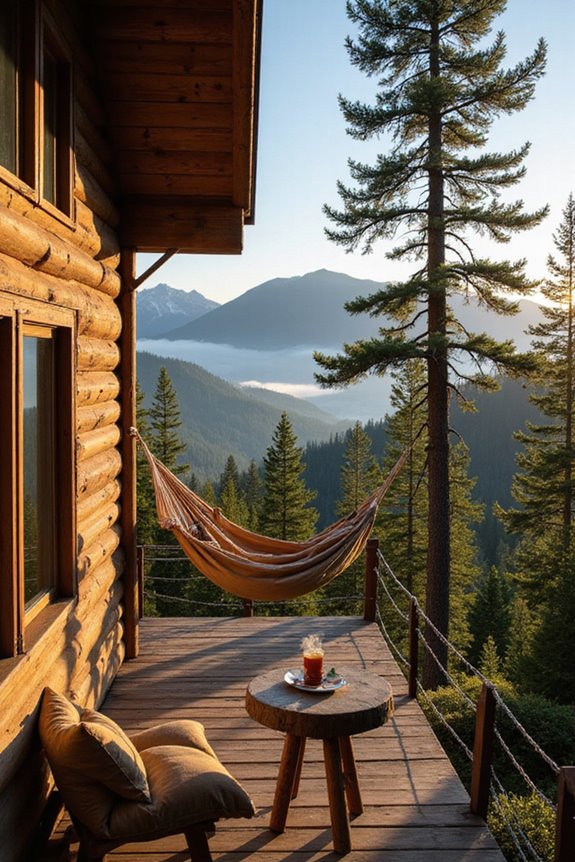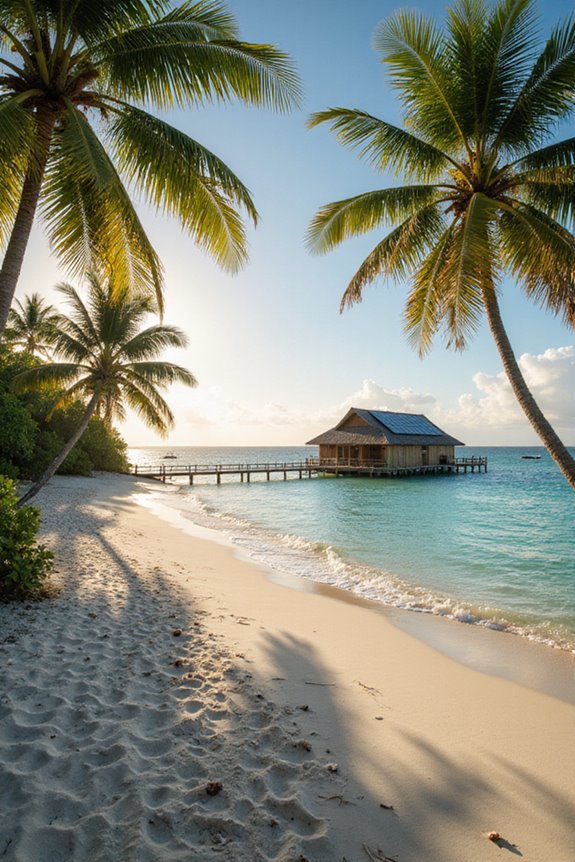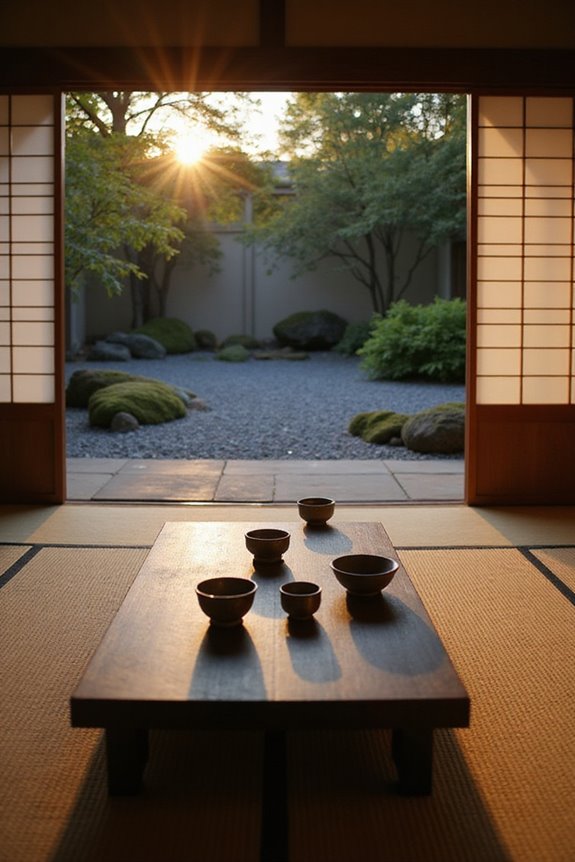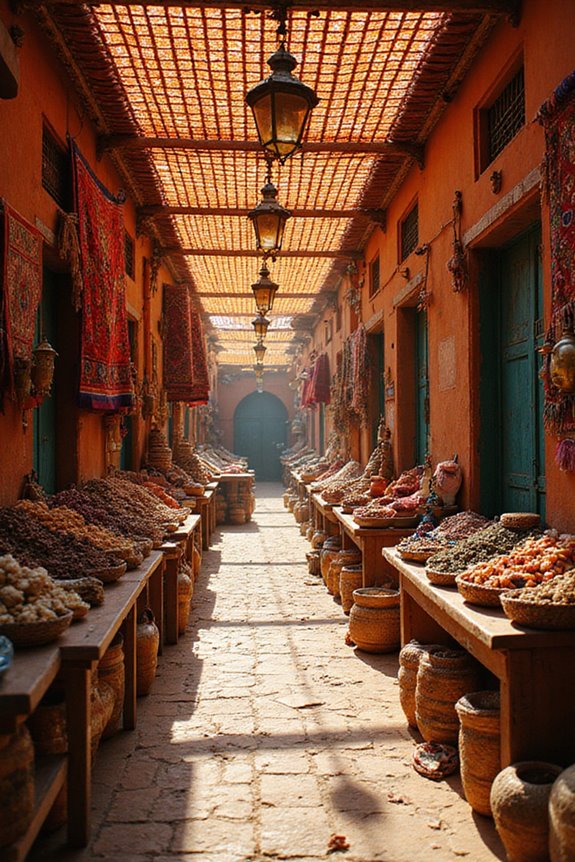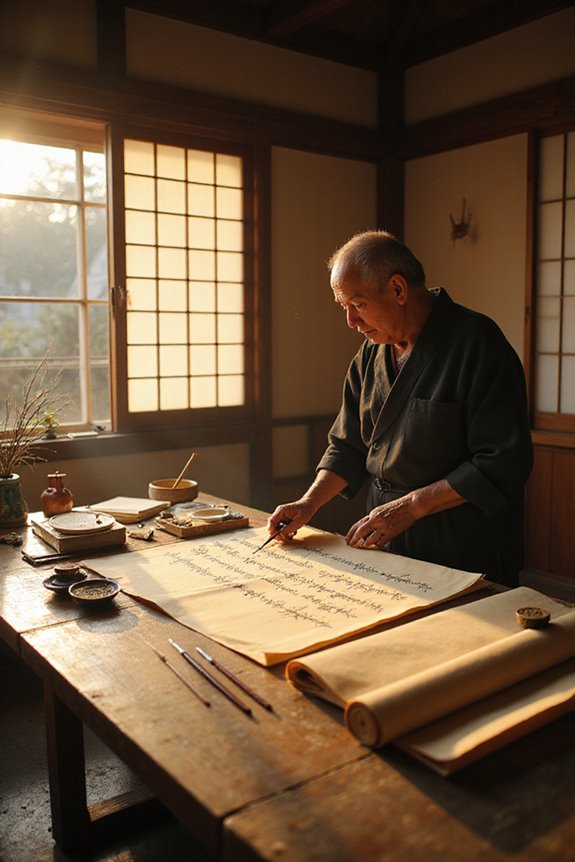Sleep tourism and digital detox vacations are all about rejuvenation and disconnecting from our chaotic lives. Picture staying in a cozy hotel with luxurious bedding, where everything is designed to help you drift off into blissful sleep—think soundproof rooms and essential oils. Now, toss in a tech-free environment, and you’re free from screens, allowing deeper connections with nature and people. It’s the perfect retreat for mental clarity and relaxation. Stick around, and I’ll share more on these transformative travel experiences!
Key Takeaways
- Sleep tourism focuses on enhancing relaxation and sleep quality through personalized amenities and wellness programs during travel.
- Destinations offer features like custom bedding, soundproof rooms, and soothing sound therapy to promote better sleep.
- Digital detox vacations prioritize disconnecting from screens, allowing travelers to engage more deeply with nature and their surroundings.
- Both trends are driven by a growing consumer preference for wellness-focused travel experiences post-pandemic.
- Benefits include improved sleep quality, reduced anxiety, and enhanced mental clarity, fostering richer life experiences.
Understanding Sleep Tourism
When you think about traveling, sleep probably isn’t the first thing that comes to mind, right? But let me tell you, sleep tourism is a game changer! Imagine staying at a cozy retreat with sleep environments designed just for you—think custom bedding, AI-powered mattresses, and soothing sound therapy. I once stayed at a place where they offered personalized sleep plans and even yoga sessions to help me unwind. It was pure bliss! As travel wellness grows, more people are seeking these unique experiences, especially after the chaos of the pandemic. The sleep tourism market is booming, and I can see why—who wouldn’t want a vacation that promises better sleep? Trust me, it’s worth checking out!
The Rise of Digital Detox Vacations
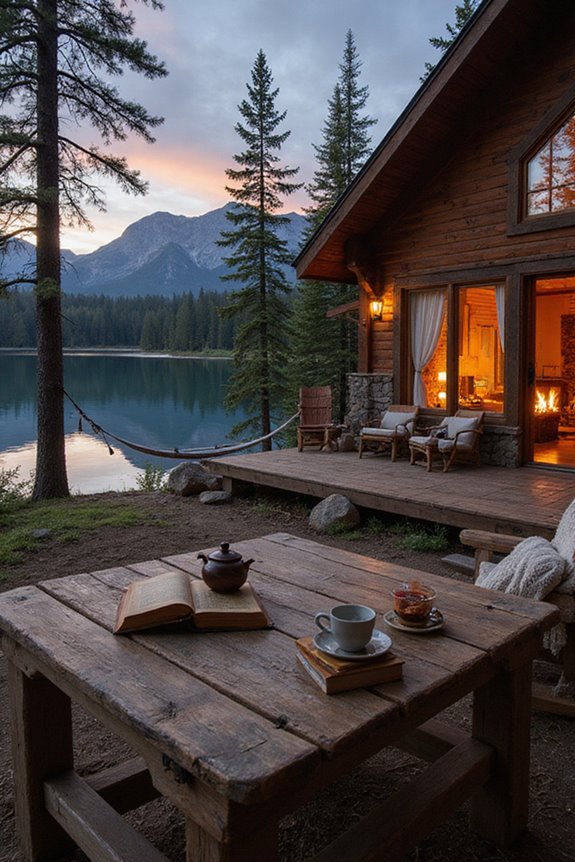
As I’ve navigated the chaos of everyday life, I’ve found myself yearning for a break from screens and notifications, which is why the rise of digital detox vacations has captured my attention. With nearly a quarter of travelers prioritizing digital disconnection, it’s clear I’m not alone. These wellness retreats often set up shop in stunning natural locations, where I can immerse myself in activities like watercolor painting or board games, far away from the buzz of my phone. The idea of surrendering my device upon arrival feels liberating, and it’s invigorating to connect with nature—and people—without distractions. As I ponder my next getaway, the thought of enjoying a tech-free environment sounds like the ultimate luxury in our hyperconnected world.
Key Characteristics of Sleep Tourism
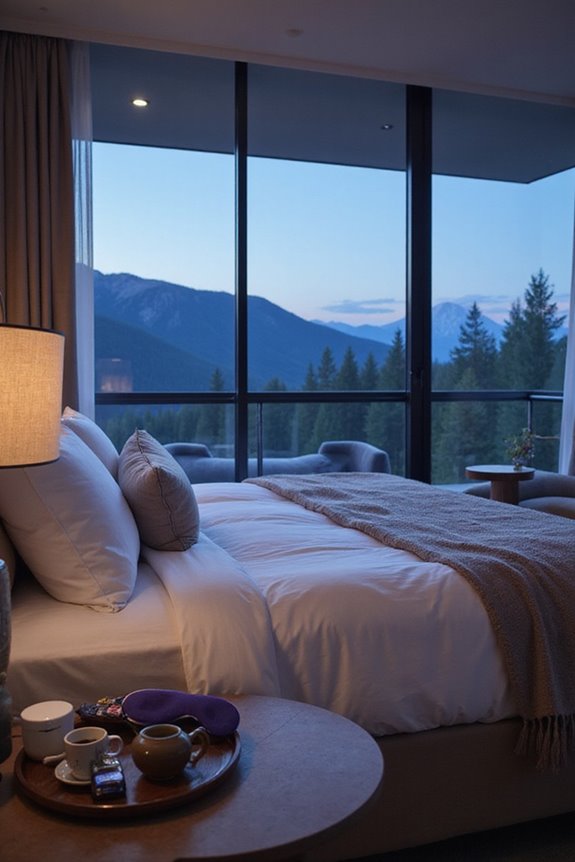
Sleep tourism has become quite the buzzword lately, and honestly, it’s no surprise. Imagine this: instead of rushing around, I’m now prioritizing relaxation and sleep quality on my trips. I seek out destinations renowned for their tranquil sleep environments, where comfort reigns supreme. Think soundproof rooms and luxury bedding that wraps me in blissful support. I can even indulge in relaxation techniques like guided meditation or soothing massages designed to ease my tension. And let’s not forget about those tempting sleep-inducing amenities—essential oils and calming soundscapes that whisk me away into dreamland! With a focus on health and well-being, sleep tourism is all about returning home refreshed and recharged. Who wouldn’t want that?
Benefits of Sleep-Centric Travel
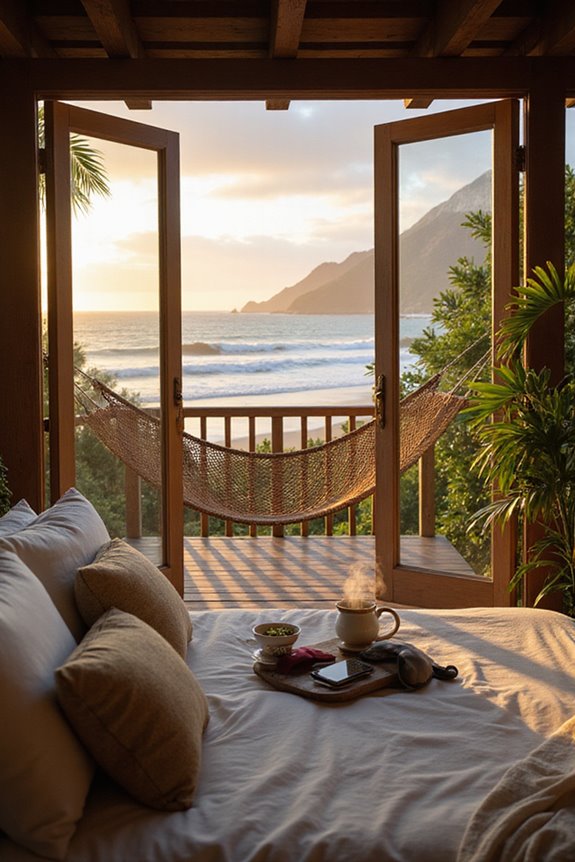
Traveling with a focus on sleep brings a whole new level of bliss to my adventures, and honestly, it’s a game changer. I’ve experienced firsthand the magic of restorative environments designed for ultimate relaxation. From cozy, optimized bedding to serene soundscapes, these places transform a simple getaway into a sensory experience that promotes deep, restorative sleep. I’ve savored sleep-friendly meals and indulged in soothing aromatherapy, making my nights feel like a mini retreat. Not only did I return home feeling refreshed, but my mood lifted, and I found clarity I didn’t know I needed. Embracing sleep-centric travel has truly enhanced my overall health, making it a delightful necessity rather than just an option. You’ve got to try it!
Exploring Domestic vs. International Sleep Tourism
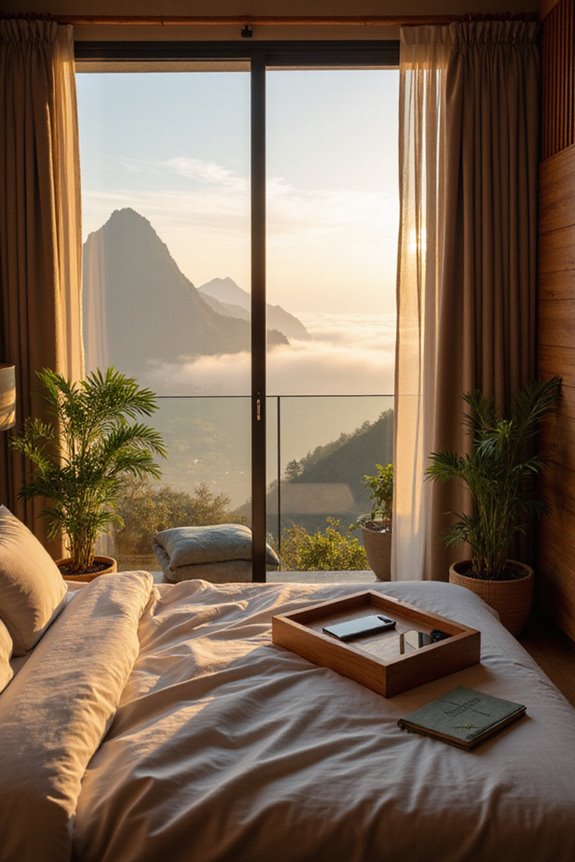
Have you ever wondered what sets domestic sleep tourism apart from its international counterpart? For me, it’s all about the comfort of familiar surroundings. Domestic preferences lean toward affordable, convenient wellness getaways, like cozy retreats nestled in nature. I love exploring local spots that offer customized bedding and sleep therapy, all without the stress of international travel.
On the flip side, international experiences are like stepping into a dream. They often feature exotic locations and exclusive treatments, making them a bit pricier but incredibly transformative. While I enjoy a quick domestic escape, there’s something magical about indulging in a luxurious sleep retreat abroad. Ultimately, whether I’m resting close to home or off on an adventure, sleep tourism always feels like a treat!
Market Trends Driving Sleep Tourism
As I reflect on my recent escapes, it’s clear that the world of sleep tourism is buzzing with excitement. With the global market projected to skyrocket from USD 74.54 billion in 2024 to a staggering USD 237.9 billion by 2034, it’s no wonder travelers are prioritizing wellness. Consumer preferences are shifting, and we’re seeking hotel innovations like temperature-regulating mattresses and calming sleep amenities. I’ve noticed how tailored wellness programs and advanced sleep technology, like AI-powered smart beds, are becoming the norm. Plus, with two-thirds of Americans sleeping better in hotels, it’s clear our travel behavior is changing. We’re all craving that deep, restorative sleep, and these destinations are enthusiastic to deliver it. Who wouldn’t want to recharge in style?
The Concept of Digital Detox
Sometimes, you just need to hit the pause button on your digital life. I mean, let’s be real—tech addiction is a real struggle. A digital detox is all about stepping away from your devices for a bit, whether it’s a few hours or several days. It’s like a mini-vacation for your brain! By disconnecting, I’ve found I can actually breathe and enjoy life without those constant notifications buzzing in my pocket. It’s a perfect way to explore digital wellbeing strategies, too. When I ditch my phone, I notice my mood lifts, my focus sharpens, and I even sleep better. Plus, I get to have real conversations without screens stealing the spotlight. So, why not give it a try?
Benefits of Disconnecting From Digital Devices
When you finally take that leap to disconnect from your digital devices, it’s like stepping into a whole new world—one where the noise of notifications fades away, and clarity takes its place. I can’t tell you how invigorating it feels! The digital disconnection benefits are impressive; I’ve noticed my sleep quality skyrockets when I ditch screens before bed. Plus, my mental health improves dramatically—less anxiety, fewer feelings of FOMO. I can actually focus on what’s happening around me, whether it’s a riveting conversation or a beautiful sunset. And hey, I’ve even made deeper connections with friends and family. It’s amazing how much richer life becomes when I’m not glued to my phone. Unplugging really does wonders!
Holistic Wellness Approaches in Travel
Holistic wellness approaches in travel have become my personal sanctuary, a blissful escape from the chaos of everyday life. When I set out on mindful travel, I seek holistic retreats that nourish my mind, body, and spirit. Picture me practicing yoga at sunrise, surrounded by nature, or diving into meditation sessions that quiet my racing thoughts. These experiences aren’t just vacations; they’re transformative journeys. I’ve found myself indulging in personalized coaching and nutrition planning, all designed to enhance my well-being. Rather than just lounging by a pool, I crave immersive activities that connect me deeply with my surroundings. Each trip leaves me refreshed and inspired, proving that wellness tourism isn’t just a trend; it’s a lifestyle choice I’m so grateful to embrace.
The Future of Sleep Tourism and Digital Detox Vacations
As I think about the future of sleep tourism and digital detox vacations, it’s hard not to get excited about the possibilities that lie ahead. With the global sleep tourism market booming, I see future innovations that cater to our evolving consumer preferences. Imagine staying in hotels with smart beds that adjust to your needs or soundproof rooms that create a personal oasis away from the chaos of daily life. The trend of combining sleep improvement with digital detox is becoming more appealing, especially as we crave those moments of pure relaxation. Plus, wellness programs featuring guided meditations and personalized sleep coaching? Count me in! It’s thrilling to envision a world where we prioritize our well-being and recharge our minds and bodies.
Frequently Asked Questions
How Can I Choose the Right Sleep Tourism Destination?
When I’m choosing a sleep tourism destination, I prioritize a peaceful sleep environment and relaxation techniques like meditation or aromatherapy. Tailored packages that integrate these elements really enhance my overall wellness experience during the trip.
Are Sleep Tourism Packages Customizable for Individual Needs?
I’ve found that many sleep tourism packages are highly customizable to fit individual needs, allowing me to express my sleep preferences. It’s all about creating a relaxing environment tailored just for me.
What Should I Pack for a Digital Detox Vacation?
When packing for a digital detox vacation, I’d stuff my bag with cozy layers, sturdy shoes, and delightful snacks. I love swapping tech for books and games, creating an adventure that’s both relaxing and unforgettable!
How Long Should a Digital Detox Vacation Last?
For my digital detox duration, I’ve found that an ideal retreat length is at least three days. It really helps me disconnect, recharge, and notice significant mental benefits as I shift my focus away from devices.
Are There Specific Age Groups That Benefit More From Sleep Tourism?
Oh sure, because nothing screams “fun” like prioritizing sleep! Honestly, age demographics reveal that those in their late 30s to early 40s reap the most sleep benefits from tourism. Who knew snoozing could be so trendy?

